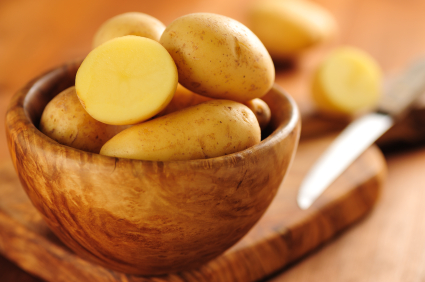Low Potassium Potatoes for Your Kidney Diet: No Soaking Required
 Potatoes are a staple in the American diet. We love hash browns or home-style fried potatoes with breakfast; french fries with burgers; baked potatoes topped with butter, sour cream, vegetables or chili and cheese; potato skins with the same toppings; stewed potatoes and mashed potatoes with gravy. No wonder the potato is so popular with so many ways to prepare them.
Potatoes are a staple in the American diet. We love hash browns or home-style fried potatoes with breakfast; french fries with burgers; baked potatoes topped with butter, sour cream, vegetables or chili and cheese; potato skins with the same toppings; stewed potatoes and mashed potatoes with gravy. No wonder the potato is so popular with so many ways to prepare them.
Potatoes are rich in carbohydrates, a good source of vitamin C, B6 and provides 2 grams of fiber. One 4-3/4″ x 2-1/3″ diameter potato with skin contains 1080 mg potassium. That’s over half the daily goal for a potassium restricted diet.
People with chronic kidney disease or on dialysis who require a low potassium diet can still eat potatoes by using a technique to reduce potassium. Although potassium is not totally removed, it is lowered enough to safely include a small portion and keep your diet kidney-friendly.
Double-cook technique for reducing potassium in potatoes
Use this newer technique to remove potassium in 30 minutes or less.
- Peel potatoes and cut into thin slices, diced small or shred for hash browns.
- Place potato pieces in a pot of water and bring to a boil.
- Drain water then add fresh water.
- Bring water to a boil and cook potatoes until tender.
- Drain water and prepare potatoes as desired.
The double cook method reduces potassium below 200 mg for a 100 gram portion (2/3 cup). Another well known technique for reducing potassium in potatoes is to cut up and soak potato pieces in water. To learn more about this technique read the article “Lowering Potassium in Potatoes” in the Diet and Nutrition Section of DaVita.com.
Try one of these kidney-friendly potato recipes low in potassium, sodium and phosphorus. Use the double cook method instead of soaking.
Low Potassium Style Stewed Potatoes
Slow Cooker Pot Roast wit Low Potassium Potatoes
Additional Kidney Diet Resources
Visit DaVita.com and explore these diet and nutrition resources:
DaVita Kidney-Friendly Recipes
This article is for informational purposes only and is not a substitute for medical advice or treatment. Consult your physician and dietitian regarding your specific diagnosis, treatment, diet and health questions.

Recent Comments